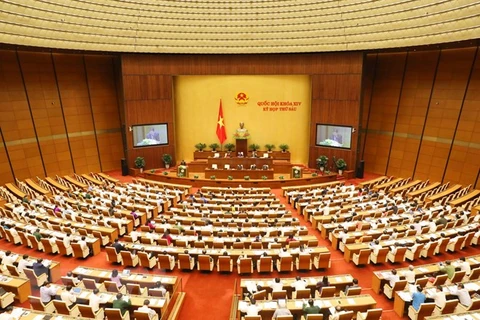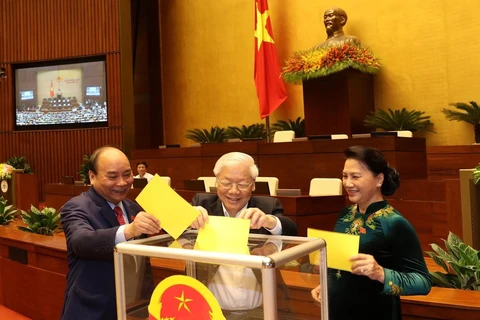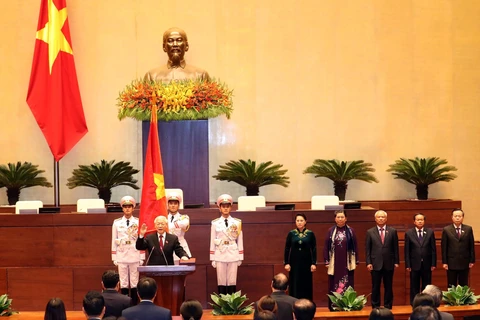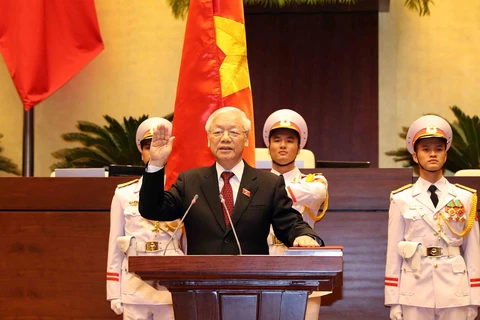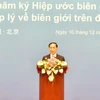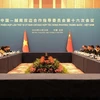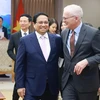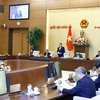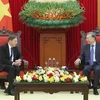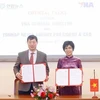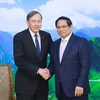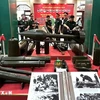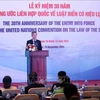Hanoi (VNA) – General Secretary of the Communist Party of Vietnam Central Committee (CPVCC) Nguyen Phu Trong was elected as President for the 2016-2021 tenure at a plenum of the 14th National Assembly’s sixth session in Hanoi on October 23.
The following is a brief biography of Party General Secretary and President Nguyen Phu Trong:
- Current positions: General Secretary of the CPVCC, President of the Socialist Republic of Vietnam, Secretary of the Central Military Commission.
- Date of birth: April 14, 1944
- Ethnicity: Kinh
- Native village: Dong Hoi Commune, Dong Anh district, Hanoi
- Current residency: No. 5 Thien Quang Street, Nguyen Du ward, Hai Ba Trung district, Hanoi
- Family background: Poor peasant
- Occupation when recruited: Student
- Date of Party admission: December 19, 1967
- Date of official admission to the Party: December 19, 1968
- Education:
General education: 10-year education system graduation
Qualification: Graduated from the Linguistics Faculty of Hanoi General University (4-year course)
Academic title, degree: Professor, PhD in politics (majoring in Party building)
Political theory: High-level
Foreign language: Russian
- Awards: First-class Resistance War Medal, Medal for Cultural Cause, and medals for the cause of the press and the young generations, among others.
- Discipline: No
- Member of the Party Central Committee: 7th, 8th, 9th, 10th, 11th and 12th tenures
- Member of the Political Bureau of the 8th, 9th, 10th, 11th and 12th CPVCC; Permanent member of the Politburo for the 8th tenure
- National Assembly deputy, 11th, 12th, 13th and 14th tenures
Summary of career :
- 1957-1963: Student at the Nguyen Gia Thieu junior and senior high schools in Gia Lam district, Hanoi
- 1963-1967: Student at the Linguistics Faculty of Hanoi General University.
- December 1967- July 1968: Officer at the Documentary Desk of the Study Review (now the Communist Review)
- July 1968 - August 1973: Editor of the Party Building Department of the Communist Review. He experienced a period of internship in Thanh Oai district, Ha Tay province (now Hanoi ) in 1971 and was Secretary of the Youth Union of the Communist Review from 1969 to 1973
- August 1973 – April 1976: Underwent a political-economic post-graduate course at the High-level Nguyen Ai Quoc Party School (now the Ho Chi Minh National Academy of Politics and Public Administration), member of the executive board of the Party cell
- May 1976 - August 1980: Editor of the Party Building Department of the Communist Review, Deputy Secretary of the Party cell
- September 1980 - August 1981: Learnt Russian at the High-level Nguyen Ai Quoc Party School
- September 1981 - July 1983: On-the-job trainee and defended Associate PhD thesis (now PhD thesis) in Party building at the Academy of Social Sciences of the Soviet Union
- August 1983 - February 1989: Deputy head of the Party Building Department, the Communist Review (October 1983); head of the Party Building Department, the Communist Review (September 1987); Deputy Secretary of the Party Committee of the Communist Review (July 1985-December 1988) and then Secretary (December 1988-December 1991)
- March 1989 – April 1990: Member of the Editorial Board of the Communist Review
- May 1990 – July 1991: Deputy Editor-in-Chief of the Communist Review
- August 1991 – August 1996: Editor-in-Chief of the Communist Review
- January 1994 - now: Member of the CPVCC (7th, 8th, 9th, 10th, 11th and 12th tenures)
- August 1996 - February 1998: Deputy Secretary of the Hanoi Party Committee, head of the Hanoi Party Committee's department in charge of tertiary education personnel, and head of the Hanoi Party Committee’s Popularisation and Education Board
- December 1997 - now: Member of the Political Bureau of the CPVCC (8th, 9th, 10th, 11th and 12th tenures)
- February 1998 - January 2000: In charge of the Party Central Committee's ideological-cultural and scientific-educational affairs
- August 1999-April 2001: Permanent member of the Party Political Bureau
- March 1998 - August 2006: Vice Chairman of the CPVCC's Theoretical Council (March 1998-November 2001); Chairman of the CPVCC's Theoretical Council, in charge of the Party's theoretical work (November 2001-August 2006)
- January 2000 - June 2006: Secretary of the Hanoi Party Committee (12th, 13th and 14th tenures)
- May 2002 - now: Deputy of the NA, 11th, 12th, 13th and 14th tenures
- June 2006 – July 2011: Chairman of the NA, 11th and 12th tenures, Secretary of the National Assembly's Party Organisation, and member of the Council for National Defence and Security
- January 2011 – now: General Secretary of the CPVCC, 11th and 12th tenures, Secretary of the Central Military Commission
- February 2013 – now: Head of the Central Steering Committee on Corruption Prevention and Control
- August 2016 – now: Taking part in the Executive Board of the Central Police Central Commission, 2015-2020 tenure
- October 2018: Elected President of the Socialist Republic of Vietnam for the 2016-2021 tenure at the 14th National Assembly’s sixth session.-VNA
VNA

